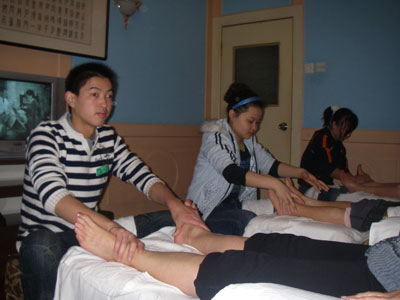Visiting a foot massage parlor is a pleasant, safe and therapeutic bargain in Beijing. Foot massage has existed as an ancient medical therapy in China for centuries. In fact, to become an established traditional Chinese doctor a student begins by studying massage, specifically foot massage, first. True, just as in the West, some massage joints are seamy, offering sex for sale along with advertised services and it’s often hard to tell what’s going on until you walk in. Fortunately for me my work mates lead me every Wednesday in lieu of lunch right around the corner to a pre-noon special price foot massage. Together we interviewed a manager of the Immortal-Aloe-Vera-Foot-Massage-Parlor, Sun Bao Guo.
VS: Mr. Sun, why do you give such great prices before noon? And why are most of your workers females?
Sun: Because the majority of our clients come after work, when their feet are tired. Others arrive after dining together. They sit and rest, enjoy a massage and then head home. As for the girls, about 75% of the customers are men and they simply prefer to look at young, pretty girls. Others prefer males for their stronger hands. Ultimately, men last longer in this field because the women, after they marry, they stay home or try other kinds of part time work.
VS: Why did you choose this profession? What are your plans?
Sun: I’m 25 and from Hebei, I came to Beijing 3 years ago looking for a good job. I saw that to be trained enough to begin work as a masseuse only takes 6 months, it’s not too expensive, and I realized I liked it. But I want to study further. I’ve done this for 3 years, gone back to my school for conferences and additional training but I hope to go back to school to study to be a doctor.
VS: How many levels of expertise exist for massage?
Sun: There are three levels, each with three years study. The very top qualifies you to massage as a Chinese traditional doctor, but doctors also need additional medical studies. TCM doctors are skilled in massage, medicinal knowledge and acupuncture. Most Chinese doctors are men, perhaps because massage is so rigorous.
VS: Why is massage focused on the foot in China?
Sun: We offer other types of massage as well: head, neck and shoulders, full body, specific areas for ailments, but its true that most come for foot massage. People use their feet constantly; it’s one of the first places as you age to suffer from physical complaints. Plus the foot contains pressure points that correspond to all the major organs of your body; by massaging them we are dispensing preventive medical services. The foot also carries your weight, so it’s good to rub it and relax it.
VS: My organs are connected to my foot?
Sun: TCM teaches us that the hand, head and the foot have specific pressure points that are indeed connected to your body parts. By applying pressure any blockages or anomalies can be gradually alleviated. The charm of TCM is that is it non-invasive – but Western people often complain that it takes too long or that the results are not dramatic enough. We Chinese feel that patience and moderation are more suitable in both life and medicine.
VS: Can you please explain the massage strategy?
Sun: Certainly. First we soak your feet in hot water mixed with Tibetan herbs; this relaxes your feet and allows us to give them a quick wash. We always begin massage with the left foot because the left contains your heart point. We ask clients about their heart because applying pressure to this area can cause disturbances. My aim in massage is to thoroughly invigorate all the major pressure points, relax the muscles and tendons, and help the general circulation. Massage here lasts 90 minutes.
VS: How does your massage compare to Chinese blind masseuses?
Sun: The blind are said to be more intuitive so their hands are supposedly very clever, but I personally feel that a sighted person can identify and feel areas with eyes and hands as well or better than a blind masseuse. In 1904 foreign missionaries developed blind massage out of empathy for these disabled people and I’m glad that they have a valid profession.
VS: Tell me about your facilities.
Sun: We have 15 rooms; some are for two, three, four, or six. Customers like to come and enjoy massage with their friends; it is a social activity in China. Some rooms have comfortable chairs; others have massage tables.
VS: How is your massage different from Western massage?
Sun: Traditional Chinese massage is health-directed – not sensual. Unlike Western massage, Chinese massage requires that clients remain fully clothed, except foot massage. During foot massage the client removes both shoes and socks, because the foot is soaked, cleaned and rubbed by the masseuse. Ready for your massage?
VS: Yes!
(China.org.cn by Valerie Sartor November 26, 2007)


